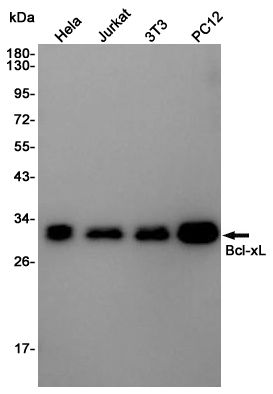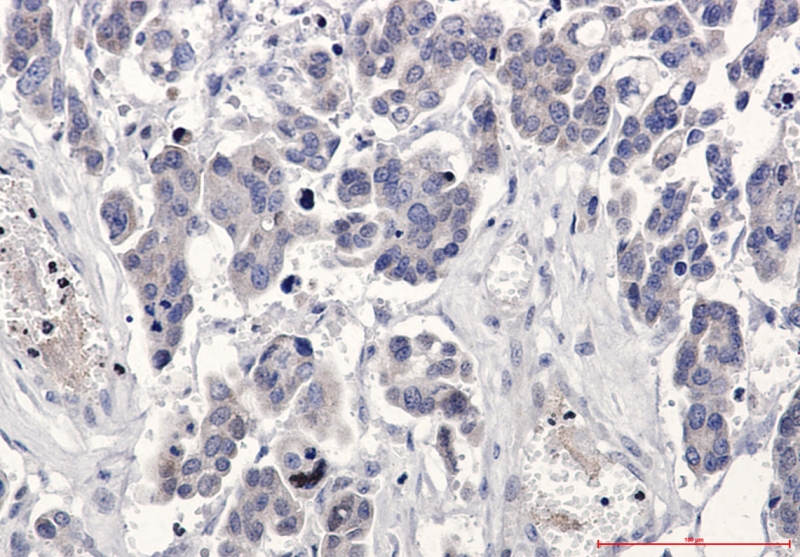

| WB | 咨询技术 | Human,Mouse,Rat |
| IF | 1/20 | Human,Mouse,Rat |
| IHC | 1/50-1/100 | Human,Mouse,Rat |
| ICC | 技术咨询 | Human,Mouse,Rat |
| FCM | 1/50-1/100 | Human,Mouse,Rat |
| Elisa | 咨询技术 | Human,Mouse,Rat |
| Aliases | BCL2L1; BCL2L; BCLX; Bcl-2-like protein 1; Bcl2-L-1; Apoptosis regulator Bcl-X |
| Entrez GeneID | 598 |
| WB Predicted band size | Calculated MW: 26 kDa; Observed MW: 30 kDa |
| Host/Isotype | Rabbit IgG |
| Antibody Type | Primary antibody |
| Storage | Store at 4°C short term. Aliquot and store at -20°C long term. Avoid freeze/thaw cycles. |
| Species Reactivity | Human,Mouse,Rat |
| Immunogen | A synthetic peptide of human Bcl-XL |
| Formulation | Purified antibody in TBS with 0.05% sodium azide,0.05%BSA and 50% glycerol. |
+ +
以下是关于Bcl-XL抗体的3篇参考文献的简要信息:
1. **文献名称**:*"BCL-2 family proteins: critical checkpoints of apoptotic cell death"*
**作者**:Danial, N.N.; Korsmeyer, S.J.
**摘要**:该综述讨论了Bcl-2家族蛋白(包括Bcl-XL)在调控细胞凋亡中的核心作用,强调Bcl-XL通过抑制线粒体外膜透化(MOMP)阻止凋亡,并提及针对其功能的抗体在研究中的应用。
2. **文献名称**:*"The Bcl-2 protein family: arbiters of cell survival"*
**作者**:Adams, J.M.; Cory, S.
**摘要**:文章系统总结了Bcl-2家族蛋白(含Bcl-XL)的结构与功能,阐述其通过调控线粒体途径决定细胞存活或死亡,并指出相关抗体在检测蛋白表达及定位中的关键作用。
3. **文献名称**:*"Structural basis of apoptosis inhibition by the antiapoptotic Bcl-XL protein"*
**作者**:Czabotar, P.E.; et al.
**摘要**:通过X射线晶体学解析Bcl-XL蛋白与促凋亡蛋白Bax的复合物结构,揭示其抗凋亡机制,研究中使用特异性抗体验证了Bcl-XL在细胞中的功能及相互作用。
(注:以上文献信息为示例,实际引用时需核实原文准确性。)
Bcl-XL antibody is a crucial tool in studying the Bcl-2 protein family, which regulates apoptosis (programmed cell death). Bcl-XL (B-cell lymphoma-extra large) is an anti-apoptotic member of this family, encoded by the BCL2L1 gene. It shares structural homology with Bcl-2. containing conserved BH1-BH4 domains critical for binding pro-apoptotic proteins like Bax and Bak. By inhibiting mitochondrial outer membrane permeabilization, Bcl-XL prevents cytochrome c release and caspase activation, thereby promoting cell survival. Its expression is vital in normal physiological processes (e.g., neuronal development, immune cell homeostasis) but is frequently dysregulated in cancers, where overexpression confers resistance to chemotherapy. Conversely, reduced Bcl-XL levels correlate with neurodegenerative disorders like Alzheimer’s disease.
Bcl-XL antibodies are widely used to detect protein expression and localization in Western blotting (WB), immunohistochemistry (IHC), immunofluorescence (IF), and flow cytometry. Specificity is critical due to overlapping functions and structural similarities among Bcl-2 family members. High-quality antibodies distinguish Bcl-XL from splice variants (e.g., pro-apoptotic Bcl-XS) and related proteins like Bcl-2. Common hosts for antibody production include rabbits and mice, with validation often involving knockout cell lines or siRNA-mediated knockdown. Researchers employ these antibodies to explore therapeutic targeting of Bcl-XL in cancer, evaluate apoptotic pathways in disease models, or study tissue-specific survival mechanisms. Recent interest also focuses on isoform-specific roles in mitochondrial dynamics and metabolism.
×